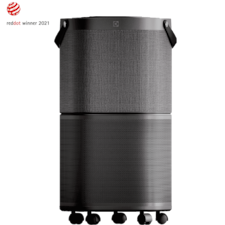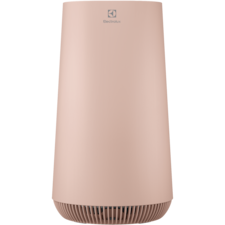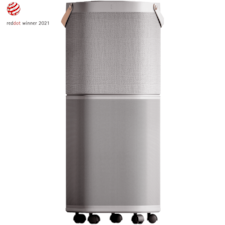Many of us are spending much more time indoors than generations past. Sadly, there are many airborne pollutants within your house, including mold spores, pet dander, allergens, and VOCs. If you have struggled with cough, a runny nose or continuous headaches, your home might just be severely polluted.
Thus, many homeowners are looking for an appliance that can the air and improve their home environment. And here comes air purifiers.
Air purifiers have grown in popularity in recent times. These devices promise to improve your home environment, but do air purifiers work? Read on the articles brought by Electrolux India to find out myths & facts behind.
Air purifiers basically work by disinfecting air that may contain pollutants, allergens, and toxins. An air purifier usually consists of one or multiple filters, and a fan that sucks in and circulates air. As air moves through the filter, pollutants and particles are captured, and the clean air is pushed back out into the living space. The exacts removals from an air purifier depends on which type you choose. Typically, air purifier filters are made of paper, fiber (often fiberglass) or mesh, and they require regular replacement to maintain efficiency.
Most filter available nowadays are designed to catch particles such as smoke, dust or pollen. For VOC’s (volatile organic compounds) or radon (that may accumulate from adhesives, paints or cleaning products), activated carbon filter is used which eliminates these impurities from the indoor air.
In addition, the effectiveness of air purifiers in real-world situations is unlikely to mimic the effectiveness of controlled conditions in the laboratory. The location, installation, flow rate and run time for all will vary, as will the conditions in the space. Moreover, there are other things happening in your home that may affect the efficiency like open or closed doors and new particles are constantly emerging, so the air might not be as filtered as expected.
You might want to read 5 tips on how to use an air purifier effectively.
HEPA means “High Efficiency Particulate Air”, but not all HEPAs are alike. There are many different types and what you should look for is the one marked as true HEPA.
Electrolux HEPA air filter can trap even the minutest particles (99.5% particles up to 0.003 microns small or 3 nano meter small) such as pollen, mold spores, dust mites and other allergens. Additionally, it also reduces the occurrence of various allergic reactions.
Once the impurities are trapped inside you don’t have to worry about it escaping, however it’s crucial that you replace filters when needed so that you keep getting uninterrupted supply of clean and healthy air in your home as bacteria and mold can accumulate on the fibers within the filter
Find out more about what Electrolux are doing to improve wellbeing at home.
The short answer is “Yes” – however, an air purifier likely won’t remove or sanitize all particles in your home. This is due to the fact that many particles can sit on soft surface like furniture, bedding, and carpeting, as well as hard surfaces, such as your walls. Regular Vacuuming and Use of Air Purifier will ensure well being of you and your family.
Allergens refers to generally harmless substances that that can create adverse immune responses in the form of allergies or asthma. Indoor airborne allergens can include pet dander, dust mites, pollen and mold.
Some air purifiers are effective at filtering allergens from the air. HEPA air purifiers, in particular, have been shown to be effective.
Like allergens, indoor mold particles can become especially dangerous for people with asthma and other lung-related diseases. With 5 stage filtration, Electrolux Air Purifiers can filter off bacteria and viruses also.
Smoke is considered a big concern when it comes to indoor pollution. Filter-equipped air purifiers may also remove smoke in the air, including smoke from landscape and tobacco smoke.
Availability of Activated Carbon filter helps in removing the smoke from indoor air.
Not only may your home be a source of airborne allergens and mold, but it may also be a source of indoor toxins from cleaning products, personal care products, and more.
When these particles live in the air, they can become harmful to your body. Air purifiers may also trap indoor toxins, but the best way to get rid of toxins in your home is to reduce their usage in the first place.
4 stage and 5 stage filtration in Electrolux Air Purifiers help removing them from air as effective as 92%*.
(*) Based on tests conducted by GTT Laboratory in Nov 2020 according to GB/T 14295-2008 standard.
Please consider Air Cleaning capacity of Air Purifiers to understand which will be best suited for your home.
For Easy understanding we have defined Area Coverage in Sq Ft for Electrolux Air Purifiers (Link), so it is easy to choose for a small home Or a Large Open Space or a Small Office.
Air purifiers with HEPA filter system are proven to help reduce the novel coronavirus (SARS-CoV-2) in the air, and laboratory tests have shown a virus removal rate of up to 99.99%*.
(*) After biosafety Laboratory MRIGlobal test to effectively remove up to 99.99% of the novel coronavirus (SARS-CoV-2) in a 0.37m³ chamber. This experiment cannot confirm that it can kill the new coronavirus (SARS-CoV-2) or completely avoid the risk of infection and should not be used in conjunction with other prevention methods. Experimental results from the test chamber are not directly applicable to open spaces or larger rooms.
If you need further information about our products, find the support you need for your Electrolux air purifiers now!
Despite their potential benefits, air purifiers may be futile if you don’t take other steps to create cleaner air in your home, too.
Following below tips and tricks to prevent harmful particles from entering your indoor air space:
So, do air purifiers actually work? It is definitely effective to trap most pollutants and allergens, but some will still remain in the air. Therefore, air purifiers are best used not necessarily by themselves, but to complement other air quality improvement strategies such as increased cleaning or cleaning with eco-friendly products to reduce irritants, using indoor plants to help with air quality, and improving ventilation in the home.
Thus, many homeowners are looking for an appliance that can the air and improve their home environment. And here comes air purifiers.
Air purifiers have grown in popularity in recent times. These devices promise to improve your home environment, but do air purifiers work? Read on the articles brought by Electrolux India to find out myths & facts behind.

How do air purifiers work?
Air purifiers basically work by disinfecting air that may contain pollutants, allergens, and toxins. An air purifier usually consists of one or multiple filters, and a fan that sucks in and circulates air. As air moves through the filter, pollutants and particles are captured, and the clean air is pushed back out into the living space. The exacts removals from an air purifier depends on which type you choose. Typically, air purifier filters are made of paper, fiber (often fiberglass) or mesh, and they require regular replacement to maintain efficiency.
What are air purifiers supposed to filter out?
Most filter available nowadays are designed to catch particles such as smoke, dust or pollen. For VOC’s (volatile organic compounds) or radon (that may accumulate from adhesives, paints or cleaning products), activated carbon filter is used which eliminates these impurities from the indoor air.
In addition, the effectiveness of air purifiers in real-world situations is unlikely to mimic the effectiveness of controlled conditions in the laboratory. The location, installation, flow rate and run time for all will vary, as will the conditions in the space. Moreover, there are other things happening in your home that may affect the efficiency like open or closed doors and new particles are constantly emerging, so the air might not be as filtered as expected.
You might want to read 5 tips on how to use an air purifier effectively.
What is Electrolux HEPA Filter?
HEPA means “High Efficiency Particulate Air”, but not all HEPAs are alike. There are many different types and what you should look for is the one marked as true HEPA.
Electrolux HEPA air filter can trap even the minutest particles (99.5% particles up to 0.003 microns small or 3 nano meter small) such as pollen, mold spores, dust mites and other allergens. Additionally, it also reduces the occurrence of various allergic reactions.
Once the impurities are trapped inside you don’t have to worry about it escaping, however it’s crucial that you replace filters when needed so that you keep getting uninterrupted supply of clean and healthy air in your home as bacteria and mold can accumulate on the fibers within the filter
Find out more about what Electrolux are doing to improve wellbeing at home.

So, do air purifiers actually work?
The short answer is “Yes” – however, an air purifier likely won’t remove or sanitize all particles in your home. This is due to the fact that many particles can sit on soft surface like furniture, bedding, and carpeting, as well as hard surfaces, such as your walls. Regular Vacuuming and Use of Air Purifier will ensure well being of you and your family.
Allergens
Allergens refers to generally harmless substances that that can create adverse immune responses in the form of allergies or asthma. Indoor airborne allergens can include pet dander, dust mites, pollen and mold.
Some air purifiers are effective at filtering allergens from the air. HEPA air purifiers, in particular, have been shown to be effective.
Do air purifiers work for mould?
Like allergens, indoor mold particles can become especially dangerous for people with asthma and other lung-related diseases. With 5 stage filtration, Electrolux Air Purifiers can filter off bacteria and viruses also.
Smoke
Smoke is considered a big concern when it comes to indoor pollution. Filter-equipped air purifiers may also remove smoke in the air, including smoke from landscape and tobacco smoke.
Availability of Activated Carbon filter helps in removing the smoke from indoor air.
Indoor toxins
Not only may your home be a source of airborne allergens and mold, but it may also be a source of indoor toxins from cleaning products, personal care products, and more.
When these particles live in the air, they can become harmful to your body. Air purifiers may also trap indoor toxins, but the best way to get rid of toxins in your home is to reduce their usage in the first place.
4 stage and 5 stage filtration in Electrolux Air Purifiers help removing them from air as effective as 92%*.
(*) Based on tests conducted by GTT Laboratory in Nov 2020 according to GB/T 14295-2008 standard.
Please consider Air Cleaning capacity of Air Purifiers to understand which will be best suited for your home.
For Easy understanding we have defined Area Coverage in Sq Ft for Electrolux Air Purifiers (Link), so it is easy to choose for a small home Or a Large Open Space or a Small Office.

Can air purifiers capture the coronavirus?
Air purifiers with HEPA filter system are proven to help reduce the novel coronavirus (SARS-CoV-2) in the air, and laboratory tests have shown a virus removal rate of up to 99.99%*.
(*) After biosafety Laboratory MRIGlobal test to effectively remove up to 99.99% of the novel coronavirus (SARS-CoV-2) in a 0.37m³ chamber. This experiment cannot confirm that it can kill the new coronavirus (SARS-CoV-2) or completely avoid the risk of infection and should not be used in conjunction with other prevention methods. Experimental results from the test chamber are not directly applicable to open spaces or larger rooms.
If you need further information about our products, find the support you need for your Electrolux air purifiers now!
Other tips to improve air quality in your home
Despite their potential benefits, air purifiers may be futile if you don’t take other steps to create cleaner air in your home, too.
Following below tips and tricks to prevent harmful particles from entering your indoor air space:
- Clean floors, carpets, and surfaces often.
- Ensure your space is properly ventilated
- Replace carpeting with vinyl or hardwood flooring in the case of severe allergies.
- Wash bedding in hot water once a week.
- Bathe pets often. If you’re allergic to animal dander, try to avoid sleeping with your pets.
- Make sure your home is at the right humidity so that it’s low enough to prevent dust mites and mold.
- Quit smoking inside the house.
Verdict
So, do air purifiers actually work? It is definitely effective to trap most pollutants and allergens, but some will still remain in the air. Therefore, air purifiers are best used not necessarily by themselves, but to complement other air quality improvement strategies such as increased cleaning or cleaning with eco-friendly products to reduce irritants, using indoor plants to help with air quality, and improving ventilation in the home.
- PureProtect neutralises up to 99.99% bacteria¹.
- PureSense measures air quality and adjusts speeds.
- Very quiet operation, even when at maximum speed.
- 4-step filtration neutralises captured bacteria¹.
- Spiral outlet circulates filtered air¹.
- Quiet operation, even when at maximum speed.
- 4-step filtration neutralises captured bacteria¹.
- Spiral outlet circulates filtered air¹.
- Quiet operation, even when at maximum speed.




